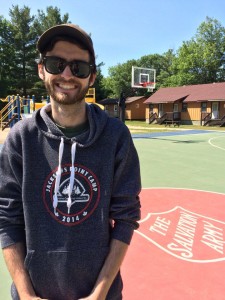Chris Noel, spent eight summers working at a Salvation Army camp. 
“I went to a Salvation Army music camp near Belleville, Ont., from ages 10-14,” says Chris. “I would always watch the maintenance crew on the ATV. My dream wasn’t to work as maintenance, but to drive the ATV because it looked so cool.”
At age 15 Chris started working at camp as a cabin counselor. Over the years he was head cabin leader and program coordinator. He spent summer 2015 as program coordinator at The Salvation Army’s Newport Adventure Camp in Northern Ontario.
Personal Growth
Chris attributes his personal growth to his camp experiences.
“Much of my education comes from camp,” says Chris. “And camp has given me opportunity to develop my interpersonal skills. I used to be very shy. Even a phone conversation would leave me with sweaty palms and shaky hands. Now I lead sessions in front of 100 or more people.”
From problem-solving to decision-making to team work and creativity, Chris has found more than a summer job. He has benefitted from learning new skills, discovered his passion for working with youth and plans to pursue a career dedicated to making a difference in the lives of young people.
Rewards of Hard Work
“I’ve never worked harder than at camp,” says Chris. “It’s complete with physical and mental exhaustion—but the rewards are great.”
Chris says that most of the kids he serves come from low-income families and difficult situations.
It’s one thing to help a kid at camp. It’s another thing to imagine what they have to go back to.
“Some come without sleeping bags, others with empty suitcases. Some don’t have toothbrushes or toothpaste and want to know why they need to brush their teeth. As you get closer to them they share heart-breaking stories. It’s tough. It’s one thing to help a kid at camp. It’s another thing to imagine what they have to go back to.”
Change Lives
“In one week, camp can change a life. I’ve seen kids come on a Monday completely isolated because they don’t know how to make friends. By Wednesday they are surrounded by other kids, smiling and having a great time.
“We have a clothing shed that restores dignity and kids don’t have to feel different from other kids. Personalities change when self-esteem is restored. And it’s great to see kids’ confidence escalate when they learn new skills.”
In one week, camp can change a life Share on XFor more than 100 years Salvation Army camps have changed lives. For more information about summer camps and what you can do to make a difference in a young life, Click Here.




